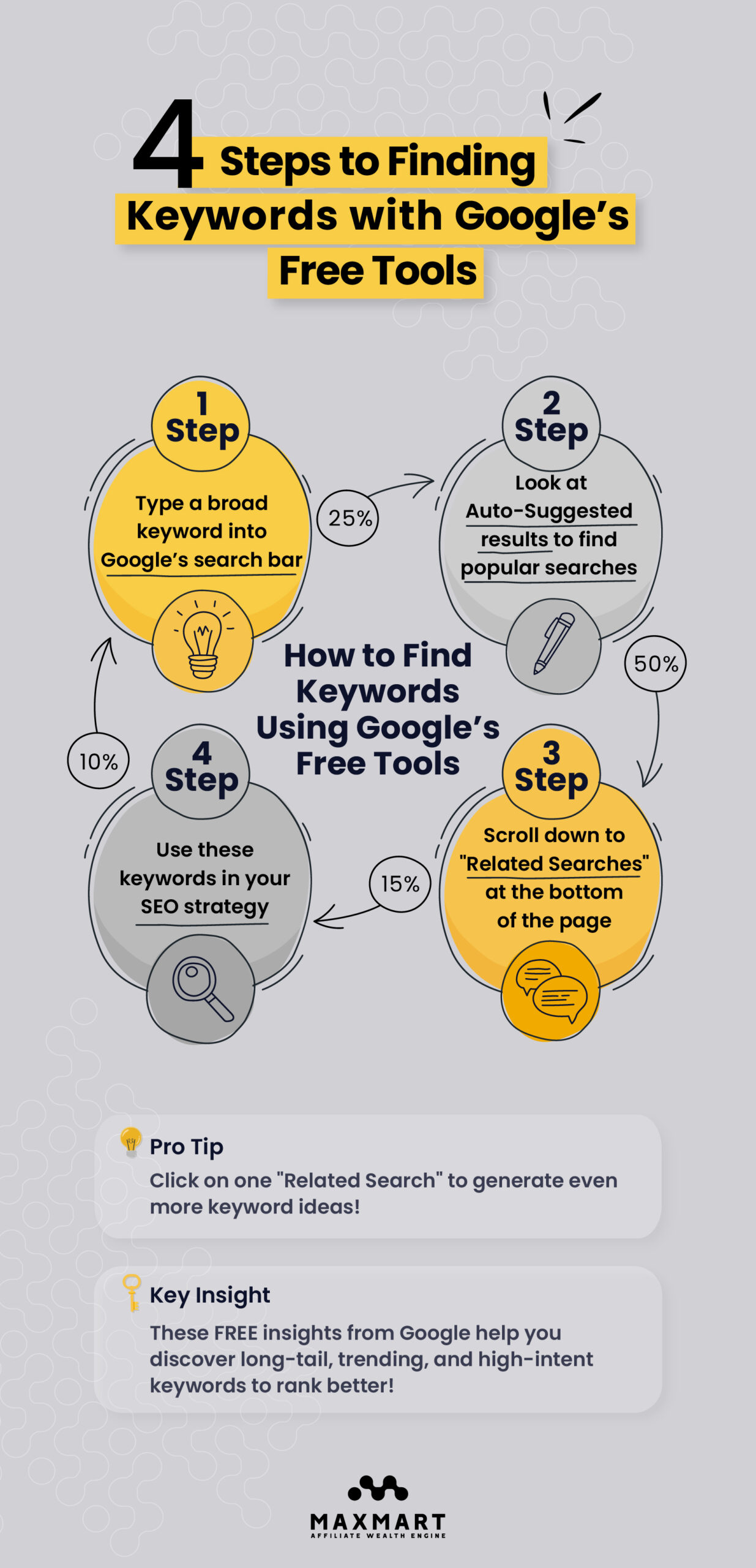
Imagine opening a store in a busy city but failing to put up a sign. People walk past, unaware of what you offer. This is what happens when a website lacks proper keyword research for SEO—potential visitors don’t find you because search engines don’t know what your content is about.
Keyword research for SEO is the process of identifying the words and phrases people type into search engines when looking for information. Choosing the right keywords helps your website rank higher on search results, attract relevant traffic, and increase conversions. Without it, even the best content may go unnoticed.
This guide will walk you through the top techniques to find the best keywords for your site. Whether you’re new to SEO or looking to refine your strategy, these tips will help you discover the ideal keywords to boost visibility and drive real results.
Enhance your affiliate marketing strategy with our comprehensive guide on affiliate marketing SEO, designed to boost your site’s visibility and conversions.

Understanding Keyword Research for SEO
Keyword research for SEO is the process of finding and analyzing the words and phrases people use in search engines to find information. It helps website owners and marketers understand what their audience is looking for and how to structure content to meet those needs.
Think of it as learning the language of your audience. By using the right keywords, you help search engines connect your content with users searching for relevant topics.
How Search Engines Use Keywords
Search engines like Google scan web pages to determine what they are about. Keywords play a major role in this process. When users type a query, search engines compare it with indexed content and rank pages based on relevance, authority, and user intent.
However, keywords alone aren’t enough. Search engines also consider factors like content quality, backlinks, and user experience to decide rankings. That’s why keyword research for SEO should always go hand-in-hand with valuable, well-structured content.
Discover the best SEO writing tools that can help you create optimized content that ranks and resonates with your audience.
Types of Keywords
- Short-Tail Keywords – These are broad, one- or two-word phrases like “digital marketing” or “SEO tips.” They have high search volume but are highly competitive and harder to rank for.
- Long-Tail Keywords – These are more specific phrases, usually three or more words, like “best free keyword research tools for SEO.” They have lower search volume but higher conversion rates because they target users with clear intent.
- LSI (Latent Semantic Indexing) Keywords – These are related terms and phrases that help search engines understand context. For example, if your primary keyword is “content marketing,” LSI keywords might include “blog writing,” “SEO strategy,” or “organic traffic.”
- Branded Keywords – Contain brand names, such as “Nike running shoes” or “Apple MacBook Pro.” These are important for businesses building brand authority and recognition.
- Transactional Keywords – Indicate purchase intent, like “buy best laptop 2024” or “discounted SEO tools.” These keywords are valuable for e-commerce and sales-driven strategies.
- Informational Keywords – Used by people looking for answers, such as “how to do keyword research” or “what is SEO.” These are great for blog content and attracting organic traffic.
- Navigational Keywords – Used to find a specific website, like “Facebook login” or “Netflix homepage.” They help users quickly reach a known website without typing the full URL.
Optimize your content to meet search engine standards with these top content optimization tools, ensuring better visibility and engagement.

8 Techniques for Conducting SEO Keyword Research
Now that you understand the fundamentals of SEO research, it’s time to put this knowledge into practice. Identifying the right keywords is only the first step—knowing how to research, analyze, and apply them effectively is what truly drives results.
In the next section, we’ll cover eight essential tips to refine your keyword research strategy. These tips will guide you toward SEO success.
1. Brainstorming and Understanding User Intent
Keyword research for SEO starts with understanding your audience. Before diving into tools and data, put yourself in the shoes of your potential visitors. What are they searching for? What problems are they trying to solve?
For affiliate marketers, this step is especially crucial. The right keywords can mean the difference between a blog post that gets clicks and conversions and one that gets lost in search results.
Thinking Like Your Audience
To find the best keywords, imagine your ideal visitor. Are they beginners looking for guidance? Experienced users comparing products? Someone ready to make a purchase?
The best key word research for SEO starts by identifying what your audience needs and how they search for it. If you’re running an affiliate site about SEO tools, someone new to the topic might search for “what is keyword research?” while a buyer might look for “best keyword research tool for SEO.”
Start with broad topics related to your niche and break them down into specific search queries. Writing down potential keywords before using any tool gives you a clear direction.
Defining User Intent: Why Searchers Choose Certain Keywords
Search engines prioritize delivering results that match user intent. Understanding intent helps you choose keywords that align with your content’s goal.
There are four main types of keyword intent:
- Informational: These searches aim to learn something. Examples: “How does keyword research for SEO work?” or “Guide to keyword research for affiliate marketing.” Great for blog posts and educational content.
- Navigational: The user wants to reach a specific website or brand. Example: “Ahrefs keyword research tool.” These are less useful for affiliate marketers but important for branding.
- Transactional: Indicates a strong intent to buy. Example: “Buy best keyword research tool for SEO.” These are ideal for product pages and affiliate recommendations.
- Commercial Investigation: The user is considering options before buying. Example: “SEMrush vs Ahrefs for keyword research.” This is a goldmine for affiliate marketers writing comparison articles.
Why User Intent Matters in Keyword Research for SEO
Using keywords without considering user intent can waste time and effort. If someone searches “best keyword research tool for SEO,” they likely want a list of tools with pros and cons—not a general guide on SEO.
Aligning keywords with user intent ensures your content reaches the right audience and converts visitors into buyers. Affiliate marketers should prioritize transactional and commercial investigation keywords since they lead to commissions.
By brainstorming search behavior and matching it with intent, you’ll build a stronger keyword list that drives both traffic and revenue. Next, we’ll explore how to use keyword research tools effectively!
To start your journey as an affiliate marketer, learn how to create an affiliate website with our step-by-step guide that simplifies the process.
2. Using Keyword Research Tools
Guesswork alone won’t get you far. A keyword might seem good, but without data, you won’t know if people actually search for it.
Keyword research tools help you find high-traffic, low-competition keywords with the potential to rank and convert. They also reveal related keywords, search intent, and keyword difficulty, making your SEO strategy much more precise.
For example, if you’re running an affiliate blog about SEO tools, you might assume “SEO software” is a great keyword. However, a tool might show that “best keyword research tool for SEO” has lower competition and higher commercial intent—making it a better choice for affiliate marketing.
Free vs. Paid Keyword Research Tools
There are plenty of tools available, both free and paid, each with its strengths.
- Free Tools:
- Google Keyword Planner – Good for basic keyword ideas but lacks competition website keyword analysis.
- Ubersuggest – Offers search volume and difficulty data but has limited free searches.
- AnswerThePublic – Great for discovering question-based keywords.
- Paid Tools:
- Ahrefs & SEMrush – Powerful tools that provide deep keyword analytics, competitor research, and backlink insights.
- Moz Keyword Explorer – Helps with keyword suggestions and SERP analysis.
- KWFinder – Great for finding low-competition keywords.
Paid tools give you a competitive edge by offering more accurate data and deeper insights. If you’re serious about affiliate marketing, investing in a premium tool can significantly improve your keyword research for SEO.
How Keyword Research Tools Help Affiliate Marketers
These tools do more than just suggest keywords—they help you refine your content strategy.
- Find profitable affiliate keywords – Look for commercial investigation and transactional keywords like “best SEO tools for beginners.”
- Analyze competitors – Discover which keywords competing affiliate sites are ranking for.
- Spot trends – Identify rising keywords before they become too competitive.
By leveraging keyword research tools, you’ll make smarter choices that lead to more traffic and higher conversions. In the next section, we’ll discuss analyzing keyword competition to refine your strategy even further!
Find high-traffic, low-competition keywords using these top keyword search tools, specifically designed to guide your SEO strategy.
3. Analyzing and Find Competitors Keywords
One of the smartest ways to improve your keyword for websites is by studying your competitors. Instead of starting from scratch, why not see what’s already working for others in your niche? Competitor analysis helps you identify high-performing keywords, spot gaps in your strategy, and discover new opportunities.
For affiliate marketers, this is especially valuable. If a competitor is ranking for “best SEO tools for bloggers,” you can target a similar keyword with better content and steal their traffic.
How to Find Your Competitors’ Top Keywords
Competitor keyword analysis starts with using the right tools.
SEO tools like Ahrefs, SEMrush, and Moz allow you to uncover the exact keywords that drive traffic to competitor sites. By entering a competitor’s domain into these tools, you can see which keywords they rank for, their search volume, and how much traffic they bring in.
For example, if you run an affiliate site about digital marketing tools, you can analyze a leading blog in the niche. You might discover they rank for “best keyword research tool for SEO,” which means you should consider writing a better, more in-depth guide on the same topic.
Finding Keyword Gaps and New Opportunities
While some competitor keywords may be too competitive to rank for immediately, others may be underutilized.
A keyword gap analysis helps you find keywords your competitors rank for—but you don’t. Many SEO tools provide a “Keyword Gap” feature, where you can compare your site with competitors and identify missed opportunities.
For example, if a competitor ranks for “best free SEO tools,” but you haven’t covered that topic, this is a prime opportunity for a new affiliate post. Similarly, you might find keywords that competitors rank for on page two—giving you a chance to optimize and outrank them.
Why Competitor Keyword Analysis is Critical for Affiliate Marketers
Affiliate marketing is competitive, and choosing the right keywords can make or break your success.
- See what’s already working – Instead of guessing, find proven high-traffic keywords.
- Discover untapped keywords – Identify gaps in your content strategy.
- Optimize and outrank – Improve existing content to perform better than competitors.
By analyzing competitor keywords, you gain a strategic advantage—learning from what works and applying it to your own keyword research for SEO. Next, we’ll explore how to assess keyword difficulty and determine which terms are worth targeting.
4. Using Google Auto-Suggest and Related Searches
Google Auto-Suggest is the dropdown list that appears when you start typing a search query. It shows real-time search predictions based on what users commonly search for. This means the suggested queries are already popular, making them great targets for keyword research.
To use it:
- Open Google and type a seed keyword (broad term) related to your niche.
- Note the suggested keywords that appear.
- Try different variations and observe how the suggestions change.
For example, if you type “best keyword research tool for SEO,” Google might suggest:
- “best keyword research tool for SEO free”
- “best keyword research tool for SEO 2024”
- “best keyword research tool for bloggers”
Each of these can be a potential blog topic, especially for an affiliate site promoting SEO tools.
Exploring the “Related Searches” Section for More Ideas
At the bottom of a Google search results page, you’ll find a “Related Searches” section.
This section reveals additional search queries that users explore after searching for your primary keyword. It’s another way to expand your keyword list with minimal effort.
For example, searching for “Ahrefs vs SEMrush for keyword research” might lead to related searches like:
- “best free alternative to Ahrefs”
- “SEMrush keyword research tutorial”
- “best SEO tool for beginners 2024”
By clicking on one of these, Google will generate a new set of related searches, creating an endless loop of keyword ideas.
Why This Method is Great for Affiliate Marketing
Google Auto-Suggest and Related Searches help you find highly relevant, user-driven keywords without relying on paid tools.
- Discover what people are actually searching for – No guessing, just real-time data.
- Find long-tail keywords with lower competition – These are often easier to rank for.
- Uncover trending topics – If a suggestion appears, it’s because users are searching for it right now.
For affiliate marketers, this technique is perfect for finding high-intent, product-related searches that lead to conversions. Next, we’ll discuss how to evaluate keyword difficulty to choose the right targets for your SEO strategy!

5. Leveraging Forums, Q&A Sites, and Social Media
When it comes to keyword research for SEO, it’s crucial to understand what real users are asking and discussing. Forums, Q&A sites, and social media platforms are rich sources of insights into the questions and concerns your audience has. These platforms allow you to discover real-time, user-generated content, making them a valuable tool for affiliate marketers looking to target highly relevant and conversion-focused keywords.
By tapping into these sources, you can find keyword opportunities that are often overlooked by traditional tools, enabling you to create content that directly addresses what your audience is searching for.
Using Q&A Sites Like Quora for Keyword Research
Quora is a popular question-and-answer platform where users ask specific questions across various topics. It’s a goldmine for uncovering long-tail keywords and user intent. By searching for topics related to your niche, you’ll see the most frequently asked questions. These questions often indicate what people are actively searching for on Google.
For instance, if you’re in the affiliate marketing space, you might find questions like:
- “What is the best affiliate marketing program for beginners?”
- “How do I find profitable affiliate keywords?”
These questions can serve as excellent long-tail keywords or even blog post ideas. Additionally, they give you an understanding of the intent behind each search—whether people are looking for educational content, product recommendations, or solutions.
Exploring Reddit and Industry-Specific Forums
Reddit is another fantastic platform for understanding what your target audience cares about. Subreddits like r/SEO or r/affiliatemarketing can provide real-time discussions, opinions, and insights on trending topics.
Reddit discussions give you a pulse on what’s hot and what’s not in your industry. By diving into subreddits related to SEO, affiliate marketing, or any niche you’re targeting, you can find keywords tied to ongoing debates or new trends.
Industry-specific forums, such as Warrior Forum for digital marketing or Digital Point for SEO, also offer a goldmine of real-world search queries. Users often share challenges they face or tools they use, which can lead you to highly targeted keywords with clear user intent.
Why This is Crucial for Affiliate Marketing
Forums, Q&A sites, and social media not only reveal what people are talking about but also show the exact language they use. This helps you align your content with the way your audience thinks and speaks.
- Find niche-specific keywords – Industry forums often contain highly specific searches with low competition.
- Capture real-time trends – Platforms like Reddit and Quora highlight what’s currently on users’ minds.
- Discover long-tail keyword opportunities – Questions and discussions naturally lead to long-tail keywords that are less competitive and easier to rank for.
For affiliate marketers, this method is ideal for understanding buyer intent and creating content that addresses exactly what your audience needs. In the next section, we’ll discuss how to assess keyword search volume and competition to finalize your target keywords!
6. Evaluating and Prioritizing Keywords
When you’ve gathered a list of potential keywords from your research, it’s time to evaluate them. Not all keywords are created equal, and choosing the right ones is essential for your SEO strategy—especially for affiliate marketers who want to drive both traffic and conversions.
By considering factors like search volume, keyword difficulty, click-through rate (CTR), cost-per-click (CPC), and user intent, you can prioritize the best keywords that will help your website rank higher and attract relevant traffic.
Search Volume: Strike the Right Balance
Search volume is a critical factor when choosing keywords, as it tells you how many people are searching for a particular term.
You want to focus on keywords with a reasonable search volume—big enough to attract traffic but not so high that they’re too competitive. Extremely high-volume keywords (e.g., “SEO tools”) are dominated by large authority sites and will be difficult to rank for, especially if your website is new. On the other hand, keywords with too little search volume might not bring enough visitors to make a meaningful impact.
As an affiliate marketer, you should prioritize mid-range keywords with a steady flow of searches. For instance, “best keyword research tools for beginners” could have moderate search volume but highly specific intent—perfect for affiliate product recommendations.
Keyword Difficulty (KD): Target Keywords You Can Rank For
Keyword difficulty (KD) scores indicate how hard it will be to rank for a specific keyword. Tools like Ahrefs and SEMrush offer this metric, based on factors like the number of backlinks required, content quality, and overall competition.
As a new website, it’s smart to target keywords with a low to medium KD, giving you a better chance of ranking before you build more authority. For example, instead of aiming for the ultra-competitive “best SEO tools,” you might target a longer-tail keyword like “best keyword research tool for affiliate marketers”—less competition and still high search intent.
Low KD keywords are a great way to start building traffic, and as your site gains authority, you can gradually target more competitive keywords.
Click-Through Rate (CTR) Analysis: Does the SERP Look Crowded?
When choosing keywords, it’s also important to consider how much organic traffic you might get once you rank.
The presence of Google SERP features—like featured snippets, ads, or knowledge panels—can reduce your organic CTR. For example, if your target keyword shows a “People Also Ask” box or ads above the organic results, even a #1 ranking might not guarantee the traffic you expect.
Look for keywords with less clutter in the search results or those that offer opportunities for featured snippets. If you’re ranking for a keyword with a prominent ad section, it might not be worth your effort.
Cost-Per-Click (CPC): Indicating Commercial Value
CPC is the price advertisers pay for each click on an ad for a particular keyword. A higher CPC usually indicates a commercially valuable keyword—meaning people are willing to spend money on it.
Affiliate marketers should consider targeting keywords with a higher CPC, as they often signal that users have strong commercial intent and may be more likely to convert. For instance, a keyword like “buy best keyword research tool” will likely have a higher CPC than a more general term like “what is keyword research?” The higher CPC suggests that searchers are ready to make a purchase.
Search Intent Matching: Ensuring Relevance
Matching your keywords to search intent is one of the most important steps in keyword evaluation. A keyword might have good search volume or a low KD, but if it doesn’t align with user intent, it won’t bring valuable traffic.
Make sure your keyword matches the intent behind the search. For affiliate marketers, understanding whether a user is in an informational, transactional, or commercial investigation stage is crucial. If someone searches for “how to do keyword research,” they are likely looking for educational content. If they search for “buy best keyword research tool for SEO,” they are ready to make a purchase, making this a prime keyword for affiliate links.
7. Organizing and Implementing Keywords in Content
Once you’ve found the ideal keywords for your website, the next step is to organize and implement them effectively in your content. Proper keyword placement not only helps with SEO but also ensures that your content resonates with your audience. For affiliate marketers, this is especially critical because optimized content can drive both organic traffic and conversions. Let’s break down how to organize and use your keywords in a way that improves your site’s search rankings and attracts engaged visitors.
Strategic Keyword Organization: Finding the Right Balance
When implementing keywords in your content, it’s important to focus on relevance and balance.
Start by choosing keywords with reasonable search volume—enough to attract traffic but not so high that it becomes impossible to rank for them. For example, broad keywords like “SEO tools” have high competition, making them tough to rank for. Instead, opt for more specific phrases like “best keyword research tools for affiliate marketing.” These long-tail keywords may have a lower search volume, but they tend to have clearer user intent and are often easier to rank for.
Affiliate marketers should also consider search intent when organizing keywords. A keyword like “best keyword research tool for SEO” is a great match for affiliate content because it shows strong transactional intent—indicating that users are likely looking for a solution to purchase.
Organizing your keywords around user intent and finding a balance between volume and competition will help your content stay relevant and rank effectively.
Keyword Difficulty (KD): Target Keywords You Can Rank For
Keyword difficulty (KD) scores indicate how hard it will be to rank for a specific keyword. Tools like Ahrefs and SEMrush offer this metric, based on factors like the number of backlinks required, content quality, and overall competition.
As a new website, it’s smart to target keywords with a low to medium KD, giving you a better chance of ranking before you build more authority. For example, instead of aiming for the ultra-competitive “best SEO tools,” you might target a longer-tail keyword like “best keyword research tool for affiliate marketers”—less competition and still high search intent.
Low KD keywords are a great way to start building traffic, and as your site gains authority, you can gradually target more competitive keywords.
Track your and your competitors’ backlinks effectively with the best backlink checker tools, a key asset in evaluating SEO efforts.
Click-Through Rate (CTR) Analysis: Does the SERP Look Crowded?
When choosing keywords, it’s also important to consider how much organic traffic you might get once you rank.
The presence of Google SERP features—like featured snippets, ads, or knowledge panels—can reduce your organic CTR. For example, if your target keyword shows a “People Also Ask” box or ads above the organic results, even a #1 ranking might not guarantee the traffic you expect.
Look for keywords with less clutter in the search results or those that offer opportunities for featured snippets. If you’re ranking for a keyword with a prominent ad section, it might not be worth your effort.
Cost-Per-Click (CPC): Indicating Commercial Value
CPC is the price advertisers pay for each click on an ad for a particular keyword. A higher CPC usually indicates a commercially valuable keyword—meaning people are willing to spend money on it.
Affiliate marketers should consider targeting keywords with a higher CPC, as they often signal that users have strong commercial intent and may be more likely to convert. For instance, a keyword like “buy best keyword research tool” will likely have a higher CPC than a more general term like “what is keyword research?” The higher CPC suggests that searchers are ready to make a purchase.
Search Intent Matching: Ensuring Relevance
Matching your keywords to search intent is one of the most important steps in keyword evaluation. A keyword might have good search volume or a low KD, but if it doesn’t align with user intent, it won’t bring valuable traffic.
Make sure your keyword matches the intent behind the search. For affiliate marketers, understanding whether a user is in an informational, transactional, or commercial investigation stage is crucial. If someone searches for “how to do keyword research,” they are likely looking for educational content. If they search for “buy best keyword research tool for SEO,” they are ready to make a purchase, making this a prime keyword for affiliate links.
8. Tracking and Refining Keyword Performance
Once you’ve implemented your keywords and started driving traffic to your site, it’s crucial to monitor how well those keywords are performing. Keyword performance can fluctuate over time, and what works today may not work tomorrow. As an affiliate marketer, tracking and refining your keywords is an ongoing process that ensures you stay ahead of the competition and continue to attract the right kind of traffic. Here’s how to effectively track and refine your keyword performance for SEO success.
Tracking Keyword Rankings with SEO Tools
To stay on top of your keyword performance, use reliable SEO tracking tools like Google Search Console, Ahrefs, and SEMrush. These tools allow you to monitor how your targeted keywords are ranking in search results and provide insights into their performance over time.
Google Search Console is a free tool that shows you how your site performs in Google’s search results. It provides data on impressions, clicks, and average positions for your keywords. With this tool, you can identify which keywords are bringing in traffic, how high your pages rank for them, and whether your CTR (click-through rate) needs improvement.
Ahrefs and SEMrush offer more advanced tracking features, such as keyword rank tracking for specific countries or devices. These tools can also show you keyword trends, allowing you to see if certain keywords are increasing or declining in popularity. For affiliate marketers, tracking keywords like “best keyword research tool” will help you see if there’s an opportunity to improve your rankings or if you need to target other emerging keywords.
Automate your SEO processes with the best SEO automation software, saving you time while improving your site’s performance.
Refining Content Based on Keyword Data
Once you’ve gathered performance data, it’s time to refine your content. If certain keywords aren’t performing as expected, there could be a variety of reasons—too much competition, poor user engagement, or misaligned search intent.
Use the data to fine-tune your content:
- Update and expand underperforming pages with more comprehensive content or better-targeted keywords.
- Optimize your title tags, meta descriptions, and headings to better align with user intent.
- Improve user experience (UX) to increase engagement, such as making your content more readable, adding relevant images or videos, and ensuring your site loads quickly.
For example, if your affiliate article ranking for “best keyword research tools for SEO” is bringing in traffic but not conversions, try tweaking the copy to highlight the products more clearly or add stronger calls to action. You can also use A/B testing to see which elements of the page work best for your audience.
Optimizing for Rising Trends and Seasonal Keywords
The search landscape is always changing, and new trends or seasonal keywords can offer a boost in organic traffic if you catch them at the right time.
Track rising trends in your niche using tools like Google Trends, which shows you whether certain search terms are gaining popularity. If you notice a keyword related to your affiliate products (e.g., “best SEO tool for Christmas promotions”) is starting to gain traction, optimize your content accordingly before the keyword peaks.
Seasonal keywords are especially important for affiliate marketers who promote products that are tied to specific times of the year. By tracking search volume trends, you can optimize your content to capture high-traffic periods, such as Black Friday, holiday sales, or New Year’s promotions. If you’re an affiliate for SEO tools, for example, keywords like “best SEO tools for 2024” or “best SEO software Black Friday deals” can drive traffic during key times of the year.
Why Tracking and Refining Keywords is Essential for Affiliate Marketers
For affiliate marketers, the ultimate goal is conversions—not just rankings. Tracking keyword performance and refining your content helps you ensure that your traffic is high-quality and that your content is aligned with current trends.
- Monitor keyword rankings regularly to stay on top of changes in the search landscape.
- Refine content based on data to improve user experience and conversion rates.
- Stay flexible and optimize for trends and seasonal keywords to capitalize on short-term traffic spikes.
By continuously refining your keyword strategy, you ensure that your affiliate content remains relevant and competitive, driving both long-term traffic and higher conversion rates. In the next section, we’ll wrap up with a summary of the best keyword research practices to help you stay ahead of the curve!
Conclusion
To wrap up, effective keyword research for SEO is crucial for driving relevant traffic and boosting your affiliate marketing efforts. Start by understanding user intent, using the right tools, analyzing competitors, and evaluating keywords based on volume, difficulty, and commercial value. Implement your keywords strategically and monitor their performance to refine your approach over time.
Now it’s your turn—begin your keyword research today and watch your site rise in the rankings!
At MaxMart, we’re committed to helping you establish a meaningful online presence. From getting your website online to providing essential domain tools, SEO resources, and performance tracking, we ensure you have the proper means to drive traffic and grow your business. Explore our tools and resources to support every step of your digital path!

